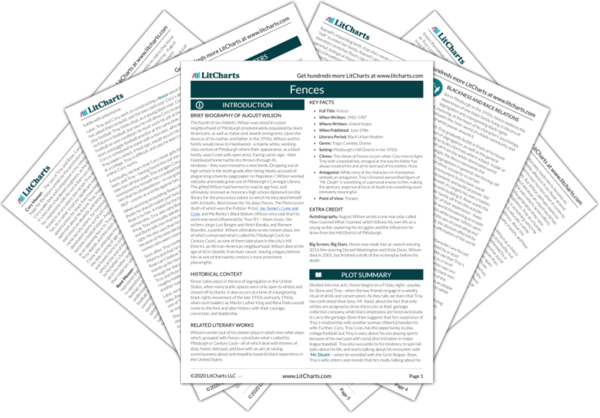The fence that Rose asks Troy to build, and envisions as wrapping protectively around her family, can be read in a several ways. On one level, the division effected by the fence seems to echo the separation of people and social spaces central to the workings of segregation—an unjust practice pervading the time in which the play takes place. Yet, while Troy and Cory’s construction of a border around their home may resonate with the racial divide plaguing the society it pictures, it’s also an emblem of black courage and strength, and of the integrity of black lives and history. Rose yearns to fence-off and fence-in her family’s lives and the bond connecting them from a racist world of white dominance—from a society bent on delegitimizing black life and casting it as second-class. The fence therefore also speaks to the psychological need Rose and many like her felt, and still feel, to preserve an inner, private life against the brunt of an outside world where that life is rejected and made to conform to the mechanisms of white power.
The fence also seems to serve as a figure for Troy’s career, resembling the perimeter of a baseball stadium: the fence he strived, with his bat, to hit beyond. Despite Troy’s talent, his skin color barred him from any chance of a steady career in the white-dominated world of professional baseball. The fence of Troy’s career, therefore, was at once a marker of his skill whenever he hit a home run, as well as a border enclosing a world and a future he could never fully enter. Therefore, when Troy builds the fence for Rose, he’s building his own limit, his own arena—a limit not imposed upon him by forces of discrimination out of his control.
While it’s critical to read the fence as a symbol of race division and how it affects the Maxson family, the motivation to build it can also be read as stemming from Rose’s sheer, maternal desire to protect and fortify her family. Additionally, Troy’s efforts to wall-off his home resonate with his ongoing conflict with “Mr. Death.” By fortifying the perimeter of his home, Troy gestures towards his desire to dam-up any lethal forces assailing him from the outside world.
The Fence Quotes in Fences
Act 1: Scene 2 Quotes
Jesus, be a fence all around me every day / Jesus, I want you to protect me as I travel on my way. / Jesus, be a fence all around me every day.
Act 2: Scene 1 Quotes
Some people build fences to keep people out . . . and other people build fences to keep people in. Rose wants to hold on to you all. She loves you.
Act 2: Scene 4 Quotes
I’m coming in and everybody’s going out…












